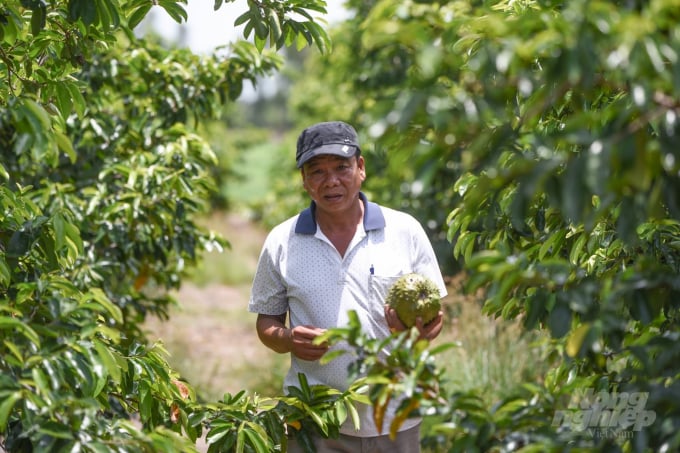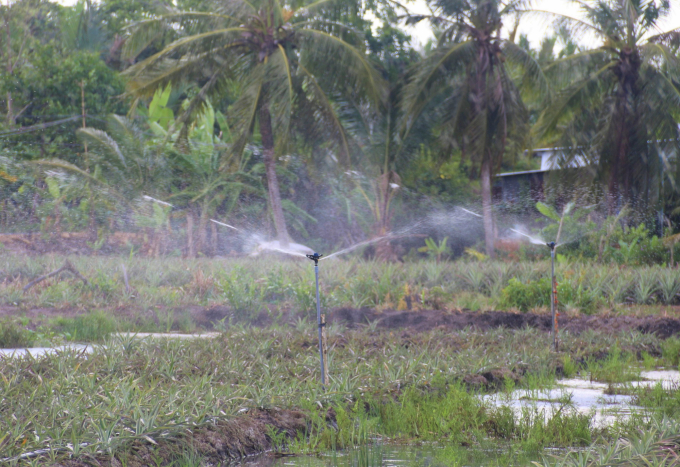June 26, 2025 | 10:16 GMT +7
June 26, 2025 | 10:16 GMT +7
Hotline: 0913.378.918
June 26, 2025 | 10:16 GMT +7
Hotline: 0913.378.918
On December 28, the Department of Agriculture and Rural Development of Hau Giang province organized a virtual conference to summarize the implementation of livelihood models and non-structural activities in the phase 1 of Cai Lon - Cai Be Irrigation system project.
According to Hau Giang's Department of Agriculture and Rural Development, four integrated livelihood models including pineapple- aquaculture, rice-shrimp, rice-vegetable and soursop cultivations have been developed with the participation of 44 people, covering more than 50 hectares. The total funding amount for the project was more than VND22 billion and would be implemented in the two years 2020 and 2021.

The livelihood models helped change farming habits, cut down costs and increase profits. Photo: Trung Chanh.
Along with that, four farmers' organizations have been established and encouraged to participate in demonstration model. Accordingly, Hau Giang Cooperative Alliance advised the local farmers to form Thanh Xuan Pineapple Farming Cooperative (in Hoa Tien commune, Vi Thanh city) and Rice-Crop Farming Cooperative (Luong Nghia commune, Long My district). Besides, the existing cooperatives including Tan Tien Rice-Shrimp Cooperative (Luong Nghia commune, Long My district) and Thuan Hoa Soursop Cooperative (Thuan Ha commune, Long Mỹ district) were consolidated.
Participating in the model, farmers were trained on farming techniques and provided with input materials such as seeds, fertilizers and feed along with tools to measure the quality of environment, equipment to prepare the soil and funding to install irrigation systems and build pesticide warehouses. In addition, they were consulted and guided to apply VietGAP and GlobalGAP standards in agricultural production and implement electronic traceability.

Hau Giang's Irrigation Sub-Department has supported the local farmers in dredging canals, building drains, installing efficient irrigation systems and reinforcing the edges of shrimp ponds. Photo: Trung Chanh.
Mai Hoang Tam, Deputy Head of Hau Giang's Irrigation Sub-Department said the agency has supported the local farmers in dredging canals, building drains, installing efficient irrigation systems and reinforcing the edges of shrimp ponds.
According to Bach Van Son, Head of Hau Giang Province's Plant Cultivation and Protection Sub-Department, with these livelihood models farmers could save at least VND6 million per hectare thanks to reduced costs of seeds, fertilizers, pesticides and reduced cost of labor. As a result, it took VND2,344 to produce one kilo of paddy rice in the demonstration model while it took VND2,646 to have the same quantity of rice in the control field. Therefore farmers could earn a profit of more than VND30 million per hectare, VND5.3 million higher compared to their conventional counterparts.
The rice -shrimp farming model has helped farmer adapt better to climate change and saltwater intrusion. This model has been applied by six members of Tan Tien Rice-Shrimp Farming Cooperative on the area of 12 hectares. They could harvest 7.76 tons of rice per hectare. Because input costs were reduced by VND3.8 million per ha farmers could increase their profits by VND2.3 million per hectare. At the same time they could make additional revenue of VND41.5 million per ha from shrimp farming. After deducting all expenses they could earn VND27 million per hectare.

With the livelihood models, Hau Giang farmers could save money on seeds, fertilizers, pesticides and labor. Photo: Trung Chanh.
Not only the members of the cooperatives but other farming households in project-related areas have been benefiting from the construction of traffic, irrigation systems and pumping stations.
"The models have contributed to raising people's awareness of the application of scientific and technical advances in agricultural production, gradually changing old farming habits, thereby reducing input costs and increasing profits. Through participating in the models, the local farmers have switched to microbial products, organic fertilizer as alternatives to chemical fertilizers and pesticides. As a result, they can produce sustainable food products," Son said.
Translated by Mai Tham
/2025/06/17/3942-2-143243_548.jpg)
(VAN) Recently, in Sweden, the Secretary of the Binh Dinh Provincial Party Committee presented the Investment Registration Certificate for the 'Polyester Fabric Recycling Complex' project to SYRE Impact-AB Company.
/2025/06/12/3721-2-202745_83.jpg)
(VAN) TH made an impression at Seoul Food 2025 with its line of natural beverages, paving the way for Vietnamese food products to enter the South Korean market.

(VAN) Soc Trang's success in rice exports stems from a strategy of developing fragrant and specialty rice cultivation areas and standardizing production toward low-emission practices.
/2025/06/11/1311-5-120811_839.jpg)
(VAN) The pig farming industry is facing the challenge of comprehensive restructuring to meet requirements for quality, safety, traceability, and market expansion both domestically and for export.

(VAN) Vietnam considers participating in ALGROALBA in order to expand agricultural production, coordinate the assessment and effective exploitation potential land.
/2025/06/05/5314-1-184727_407.jpg)
(VAN) From seemingly worthless fish scales and skin, enzymes and lactic ferments can transform by-products into peptides, opening a sustainable, effective business direction and elevating Vietnamese seafood.

(VAN) TTC AgriS and IFC signed a strategic partnership to develop a sustainable agricultural value chain, aiming to achieve the Net Zero target by 2035.